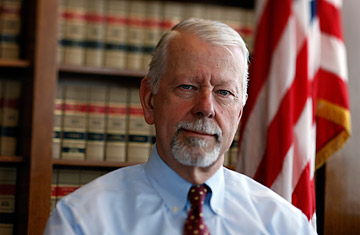
Judge Vaughn R. Walker
Did the federal judge who wrote the decision overturning Prop 8 — California's ban on gay marriage — make his ruling because he wanted to marry his longtime boyfriend?
That's the charge from the losing side in the decision issued last year by now retired Chief Judge Vaughn Walker. His ruling sent the case to what could be a possible showdown in the Supreme Court over the nature of marriage. Now that Walker has publicly confirmed he is gay and that he has had a long-term partner, proponents of Prop 8 want his successor to overturn the ruling, a decision that could all but stop the gay-marriage movement in its tracks.
"The American people have a right to a fair judicial process, free from even the appearance of bias or prejudice," Andrew Pugno, general counsel for the official proponents of Prop 8, said in a statement announcing that a motion to vacate had been filed Monday. "Judge Walker's 10-year-long same-sex relationship creates the unavoidable impression that he was not the impartial judge the law requires. He was obligated to either recuse himself or provide full disclosure of this relationship at the outset of the case. These circumstances demand setting aside his decision."
For some opponents of gay marriage, the motion to vacate was long overdue. J. Matt Barber, vice president of the activist law firm Liberty Counsel, called on Walker to step down when rumors of his homosexuality surfaced during the trial and said it was "inexplicable" that attorneys defending Prop 8 hadn't asked him to do so immediately. "With Judge Walker's recent admission that he does in fact practice homosexuality, the case for recusal has been proven," he said in an online commentary earlier this month. "His ruling on the Prop 8 case should be immediately vacated as he possessed both an incontrovertible and disqualifying conflict of interest."
That was a week ago, and on Monday, Charles Cooper, the former Justice Department lawyer who led the defense of Prop 8 at trial and is now handling the appeal, took his advice. Cooper has asked Walker's successor to toss out the decision on the grounds that Walker's orientation and his long-term relationship with a man made him incapable of rendering an unbiased decision.
There is one explanation for why Cooper waited to raise the issue of Walker's orientation until after he retired. The courts have viewed such motions in a harsh light, especially when they suggest that a judge's basic identity — his race or religion or even his political party — renders him incapable of reaching a fair decision, even if the decision could have outsize impact on members of his religion or race. Indeed, lawyers have been sanctioned for even asking — one lawyer who asked a judge to step aside because of his "Jewish bias" was disbarred, for instance — and higher courts have upheld those sanctions as entirely reasonable and within the trial judge's discretion.
Meanwhile, Cooper's motion has triggered revulsion in some corners. The motion is "offensive" and has "no chance of success," says Dean Erwin Chemerinsky, a constitutional law scholar who leads the law school at the University of California, Irvine. A Catholic judge, he said, would never be asked to step aside from an abortion ruling, even though he might face excommunication if he ruled in favor of terminating a pregnancy.
"I know of no instance in which a judge has been disqualified because of his or her race, religion, sexual orientation or gender," Chemerinsky told TIME. "This would mean that no African-American judge could have heard a challenge to segregation laws or no woman judge a challenge to a law discriminating based on sex. No court ever has suggested any such thing, nor will it. This is simply a personal attack on Judge Walker in an effort to embarrass him. As was said in another context long ago, Have they no shame?"
